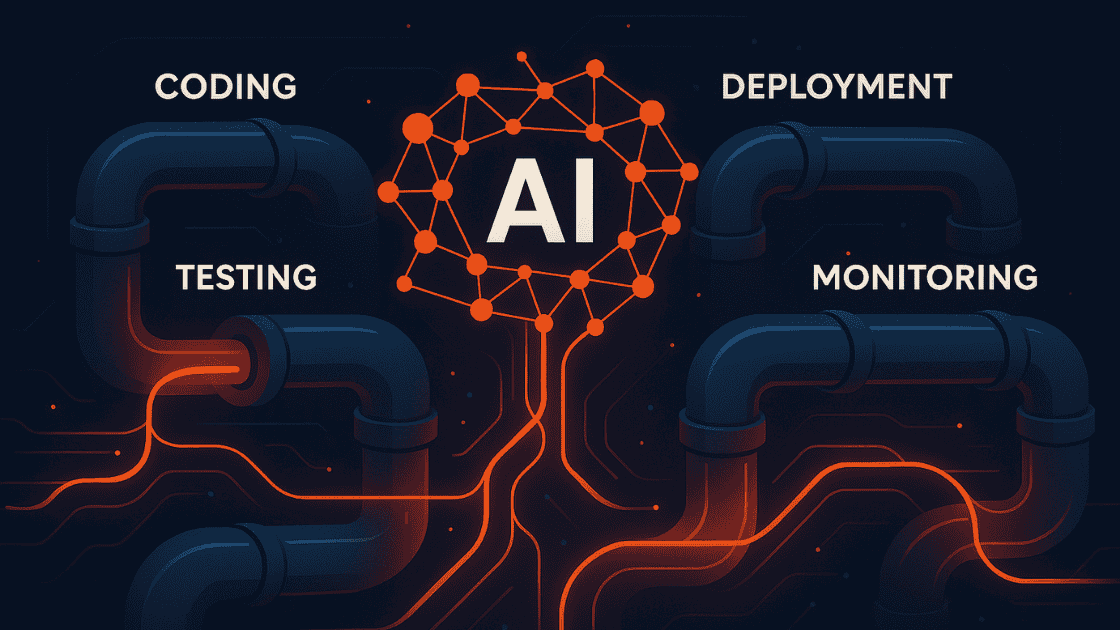
Unleashing the Power of AI in GitLab
March 13, 2024
Digital Transformation in Property Management
April 5, 2024AI-Driven Efficiency in DevOps Pipelines
In today’s fast-changing world of software development, AI-driven DevOps efficiency is more important than ever. Moreover, artificial intelligence is now a cornerstone for boosting speed and accuracy. In addition, AI-powered workflows use machine learning and automation to streamline tasks, reduce mistakes, and accelerate software delivery. By analyzing data intelligently, AI predicts problems before they appear. Therefore, teams can act early and avoid delays. This proactive approach allows developers to focus on innovation rather than repetitive work. Furthermore, the synergy between AI and DevOps increases efficiency while encouraging continuous improvement. Finally, it builds a culture of excellence in IT.
AI-Optimised DevOps Workflow Enhancement
Firstly, improving DevOps workflows with AI is a major step in managing development and operations. Moreover, AI algorithms and machine learning automate tasks like code reviews, testing, and deployment. As a result, organisations reduce time-to-market for new software releases. In addition, this AI-driven approach streamlines workflows and improves accuracy, reducing human error. Therefore, teams can spend more time on strategic, value-adding tasks. Furthermore, AI optimisation speeds development cycles while ensuring robust and reliable software. Finally, it keeps solutions aligned with user needs and business goals.
Efficiency in DevOps through AI Integration
Secondly, integrating AI into DevOps greatly improves overall efficiency. Moreover, AI enables real-time monitoring and analysis of development pipelines. As a result, teams can detect and resolve bottlenecks before they grow. Therefore, downtime is reduced, and system reliability is improved. In addition, AI-driven analytics reveal performance trends and operational metrics. These insights guide better workflow optimisation and resource use. Furthermore, AI increases the accuracy of DevOps activities while boosting adaptability. Finally, organisations can respond quickly to market demands and keep a strong competitive edge.
AI-Enhanced DevOps Process Streamlining
Thirdly, streamlining DevOps with AI is crucial for achieving operational excellence. Moreover, AI-enhanced tools support a more cohesive DevOps lifecycle from planning to monitoring. In addition, advanced analytics and machine learning reveal inefficiencies and guide optimisation. As a result, teams create a more agile and responsive environment. This approach not only speeds delivery of features but also ensures high quality and performance. Furthermore, AI-driven optimisation improves resource management, reduces waste, and maximises productivity. Finally, it fosters a sustainable and cost-effective operational model.
Machine Learning Boosted DevOps Operations
Fourthly, applying machine learning in DevOps greatly boosts efficiency and intelligence. Moreover, machine learning predicts and automates decisions, creating adaptive operational strategies. For example, by analysing past data, algorithms forecast system behaviours and automate scaling to meet demand peaks. As a result, downtime decreases and performance improves across the DevOps pipeline. In addition, machine learning enhances accuracy in CI/CD processes, supporting more frequent and reliable releases. Furthermore, its integration streamlines workflows while adding intelligence and adaptability. Finally, this capability is essential for success in modern DevOps environments.
Automated AI Solutions for DevOps Efficiency
Finally, the deployment of automated AI solutions plays a crucial role in augmenting DevOps efficiency. Automation powered by AI transforms the DevOps landscape by enabling continuous delivery and integration, facilitating a seamless flow of updates and improvements. This automation extends beyond mere task execution to encompass intelligent decision-making and predictive analysis, allowing for the anticipation of problems and the automated rectification of issues in real-time. As a result, IT teams are liberated from the burdens of routine monitoring and troubleshooting, empowering them to focus on strategic initiatives that drive business growth and innovation. The integration of automated AI solutions not only enhances the responsiveness and agility of DevOps practices but also significantly contributes to a reduction in operational costs and an improvement in overall service quality.
Benefits to Business
AI-driven DevOps pipelines boost efficiency and accuracy. Moreover, they enable faster and more reliable software deliveries. In addition, this integration helps identify and resolve issues early. As a result, downtime is reduced and resources are optimised. Furthermore, businesses gain streamlined processes, lower operational costs, and higher product quality. Finally, these improvements increase customer satisfaction and strengthen competitive advantage in the market.
Why Gitlab
GitLab is uniquely positioned to boost productivity and security with its AI-powered features. Moreover, it integrates smoothly into existing DevOps workflows. In addition, GitLab provides advanced analytics, automated code reviews, and strong security scanning. As a result, teams detect vulnerabilities early and streamline development processes. This holistic approach not only speeds project timelines but also strengthens software against threats. Finally, GitLab stands as a vital tool for secure and efficient modern software development.
Frequently asked Questions
1. Question: How does AI increase DevOps pipeline efficiency in GitLab workflows?
Answer: AI increases DevOps pipeline efficiency in GitLab by automating code reviews, optimising CI/CD stages, and reducing manual errors for faster, reliable releases.
2. Question: What are common bottlenecks AI can predict in DevOps pipelines?
Answer: AI predicts common DevOps bottlenecks like slow tests, flaky builds, queue congestion, misconfigured runners, and resource contention, enabling proactive fixes before delays grow.
3. Question: Why is automation of code reviews and testing important for DevOps efficiency?
Answer: Automating code reviews and testing improves DevOps efficiency by catching defects early, enforcing standards, and accelerating merge velocity with consistent, repeatable checks.
4. Question: How does machine learning contribute to reducing time-to-market in DevOps?
Answer: Machine learning reduces time-to-market by forecasting failures, prioritizing high-risk changes, and recommending optimal pipeline paths for quicker, confident deployments.
5. Question: In what ways does AI analytics optimise resource allocation in DevOps environments?
Answer: AI analytics optimises resource allocation by right-sizing runners, auto-scaling compute, scheduling jobs efficiently, and minimizing idle capacity to lower costs.
Resources
- Video: What is Gitlab?
- Video: Gitlab Duo
- Try the Hands on Gitlab Duo Demo here.
- Read more about Gitlab Duo Code Suggestions here.
- Download the Gitlab Duo Customer Deck here.
- Seven Questions to ask your DevOps Provider.
- Free trial: Gitlab Ultimate




